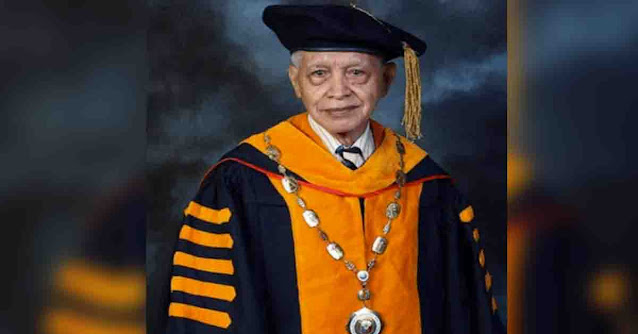 |
| Ramon Barba, the scientist who developed the availability of fresh mangoes all year round passed away at 82 years old. PHOTO: DOST/Facebook. |
Dr. Ramon C. Barba, the scientist responsible for making fresh mangoes available all year, passed away on October 10, 2021.
Dr. Barba's achievements in plant physiology, particularly in the induction of mango flowering and the micropropagation of important crop species, have earned him national and international acclaim. On June 6, 2014, President Benigno S. Aquino III bestowed the Order of National Scientist on Dr. Ramon C. Barba.
His pioneering work on mango flowering and fruiting induction resulted in the year-round availability of abundant fresh mangoes.
The consistency of mango production aided the expansion of mango exports, spawning a new industry of processed mango products. He developed FLUSH, a plant growth enhancer that accelerates the tree's growth cycle, flowering, and fruiting stages, ensuring continuous fruit production. The discovery enabled controlled flowering of mango trees in many dry areas such as Cebu and Guimaras, extending the flowering season for the entire country beyond March and April.
Mango induction technology has been patented in the Philippines, the United States, the United Kingdom, Australia, and New Zealand. He didn't charge a royalty so that ordinary farmers could freely use the technology. This technology is now used in many mango-producing countries throughout Latin America, Africa, Asia, and Australia. This technology has also been used on other fruit trees, such as cashew.
His groundbreaking work on plant micropropagation revolutionized the production of many important crops. His team at the UP Los Baños Institute of Plant Breeding developed the tissue culture protocol for bananas to produce large quantities of robust and disease-free planting materials, allowing for annual replanting, which brought about a major shift in the banana production system, which is now standard practice in large farms not only in the Philippines but also in Asia, Africa, and Latin America.
He also created the sugar cane tissue culture protocol, which allows for the large-scale production of disease-free planting materials. Disease cleaning of sugar cane varieties became the norm. Sugar cane tissue culture is now widely used in sugar cane agriculture.
Along with banana and sugar cane, his research team developed micropropagation protocols for over 40 important species of ornamental, fruit, and plantation crops, aquarium plants, and forest trees. He also used simple tools to solve complex problems in novel ways.
In 1958, he received his B.S. in Agriculture from the University of the Philippines College of Agriculture (UPCA). From 1958 to 1960, he worked as an Assistant Instructor in the Department of Agronomy, Fruit Crops Section, UP College of Agriculture. From 1960 to 1962, he studied at the University of Georgia for his M.Sc. in Horticulture, and from 1962 to 1964, he studied at the University of Hawaii with an East-West Center grant. In 1967, he completed his Ph.D. in Horticulture.
Dr. Barba returned to the Philippines in 1968, was appointed Assistant Professor in 1969, resigned in 1975, and was re-appointed Professor I in 1981. Dr. Barba was invited by IPB's founding director, National Scientist Emil Q. Javier, to initiate and develop the Tissue Culture Laboratory, now Plant Cell and Tissue Culture Laboratory, and its Tissue Culture Program. Dr. Barba served as its first Program Leader (unpaid) from 1975 to the late 1980s and has since continued to serve as a Senior Consultant on plant tissue culture and plant physiology to researchers and students.
Similarly, he held important positions in various private institutions, including Consultant, Quimara Farms on Mango Production (1969-1985), and Project Director of CORE Foundation (1984-1988). From 1985 to 1988, he was also a part-time Director of Research at Plantek, a Singapore-based biotechnology firm owned in part by Tata of India and Sumitomo of Japan.
Among his many honors are the Philippine Jaycees' The Outstanding Young Men (TOYM) of the Philippines for Agriculture (1974), the Rizal Pro Patria Presidential Award for Tissue Culture (1980), the University of the Philippines' Most Distinguished Alumni Award (2004), and the SEARCA-Dioscoro L. Umali Achievement Award in Agricultural Development (2011).
Dr. Barba was elected a member of the National Academy of Science and Technology (NAST PHL) in 2004, the country's highest scientific and technological advisory body. —Tacloban News Update (Source: DOST/PRESS RELEASE)
